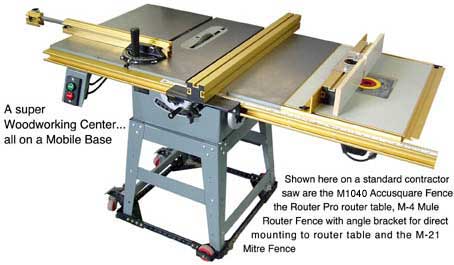
If your business is driven by word of mouth, the Internet can be a very good friend. That’s what John Withrow, principal of Mule Cabinetmakers Machine in Newmarket, Ontario, is discovering since he put his tools up on the World Wide Web so anyone could find them. “Word of mouth in Canada built our business,” says John, “and through the Internet, it’s going to do the same thing in the U.S.”
John’s company makes a variety of woodworking tools, but the Accusquare fence is the company’s best seller. It’s a rip fence for table saws, and John designed it with an eye toward making a very accurate fence that was still affordable for most woodworkers. His fence is already well-known in Canada, and he is now interested in spreading the news in the U.S. By word of mouth alone, he figures it would take about 15 years to get the message out in the U.S.; by leveraging the word of mouth power of the Internet, he is counting on a dramatically reduced timeframe.
We’re Talking Woodworking
The Internet has also been a source of inspiration for John and his company. Customers regularly suggest improvements to his fence, and many are slated for future revisions of the Accusquare. “Woodworkers are probably the most innovative people in the world,” says John, ” and they love to talk about their ideas. And most of them are really quite practical ideas.” He and his coworkers also monitor many of the woodworking forums to see what, if anything, people are saying about rip fences or table saw accuracy in general. He and his comrades are often tempted to jump in when someone asks for recommendations about aftermarket fences, but they quell their keyboards. And they don’t ask their friends to intervene either. “One of the things we never do is get somebody to go on the Internet to say anything about our product. To us, that’s important. That’s integrity,” says John.
His company’s philosophy of selling directly to customers, except for a couple of dealers in Canada, was dictated by John’s desire to keep the costs of the Accusquare and other tools low. That strategy is also tailor-made for the Web, where buyers can ask a group of peers instead of sales clerks at a hardware warehouse about their experiences with a tool.
That happened recently on one forum he was reading. A participant got on bragging about how he went to one of the few dealers that carried the Accusquare. The salesperson there talked him out of that rip fence and into a less expensive one because it was heavier and made of steel rather than aluminum. About 30 Accusquare owners jumped all over him for his decision and suggested his cheaper heavier fence might be a good boat anchor. It was gratifying, says John, to see his customers saying such nice things about him and his fence.
Why a Mule?
John’s company started, as is common in this industry, as a woodworking shop. He did a lot of cabinet making and decided that a sliding table was essential to doing a good job. He built one for himself and his shop and, when others liked it, built some more. He decided to start Mule as a toolmaking company and started building other tools. Each time he chose a new product, it was because the tool represented something he himself needed and would use as a professional woodworker.
And utility is one of the guiding principles for the tools John designs. He really wants customers to use his products so much that they don’t even need to think about them anymore. “There’s so many tools you buy these days,” he says. “When you look at them, they’re great. When you get them home, they become a little iffy. And you use them and they are no good at all.”
A lot of tools require a lot of adjusting and monkeying just to get them working right, says John. Unless you’re buying a Powermatic 66, he says, most table saws need some work before you can get them up and running. That rubs him the wrong way. “Everything that we’ve built is designed so people can put it on their saw and get it working right; then they don’t have to deal with it anymore,” he says.
Finally, there’s the matter of naming his company. John called it Mule because of the nature of these animals. Mules are hardworking, reliable, strong animals that require little maintenance and can keep going forever. It’s a great model for the tools we use and love.
– Bob Filipczak





